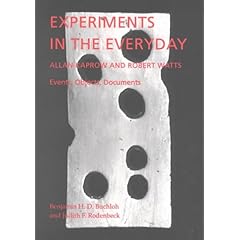
I was revising my ongoing annotated bibliography tonight and came across this book I read last year, Experiments in the Everyday: Allan Kaprow and Robert Watts – Events, Objects, Documents. Notes and quotes as follows:
“One can imagine an audience environment where the audience becomes the sole activator and responds to itself". –Robert Watts
“One could thus argue that Watt’s heightened sense of the necessity to make the viewer activity participate in the event structure of the work- even if only in the banal and benign forms of social exchange and public communication resulted first of all from insight into the consequences of collectively enforced consumption.”(Buchloh 1999, 17-18)
“By Contrast, the Fluxus artists recognized the commodity form as historically insurmountable, as a failed utopia whose sole, if any, dimension of promise would remain its intrinsically egalitarian element and its potential to establish a competence of object relations, in lieu of a linguistic or political competence of political self-determination. Thus the relationships of Fluxus to commodity culture are both mimetic and polemical, performing gags on the totality of reification and enacting farces with minimally redeeming functions.”((Buchloh 1999, 22)
Similarly relational aesthetics criticizes commodity culture, especially the commodification of human interaction.
“Schapiro’s social philosophy of art has two significant implications for the theory of modern art that, years later, he would reconfigure into a theory of the avant-garde. Kaprow, in turn, would later complicate Schapiro’s theory in his conception of happenings. First, an artist’s egotistic obsession with the purely aesthetic, pursued in the privacy of his studio, is a product of capitalism’s economic, political, and class-based ideology of the “private.” The artist’s “ego,” then, is not his own- by pursuing what capitalism in its most advanced andexpanded form has rendered “archaic”: individual handicraft.” (Haywood 1999, 28)
In a revolutionary call-to-arms, Schapiro pleaded for artists to aquire the “courage” to act on and “change” society by redirecting their concerns to “the world around them, its action and conflict” (my emphasis). Artists turning to the world would see that the system requiring “impoverished masses and oppressed minorities” was the same system that produced an art “committed to the aesthetic movements of life, to spectacles designed for passive, detached individuals” as well as “an art of the studio” (my emphasis).” (Haywood 1999, 29-30)
“…a dramatic enactment of an often minimal and hughly ascetic totality of sounds, texts, gestures, and objects, which George Brecht had defined as an “event.”(Buchloh 1999, 11)
“Rather, the need was for ‘the extension of the museum… as a force for innovations lying outside of its physical limits.’ A contemporary museum, therefore, might well serve as an ‘agency for action.’” (Haywood 1999, 42)
“If, as Jeff Wall has suggested, the photograph ‘shows its subject by means of showing what experience is like; in that sense provides ‘an experience of experience,’’” (Rodenbeck 1999, 64)
“I had gone to John Cage’s class and asked, “How the hell do you get people to do this silly stuff?” So he told me about me about his early beginning with chance music. “You have to begin with friends,” he said. “Get the people that you like and like you.”(Kaprow 1999, 69)





